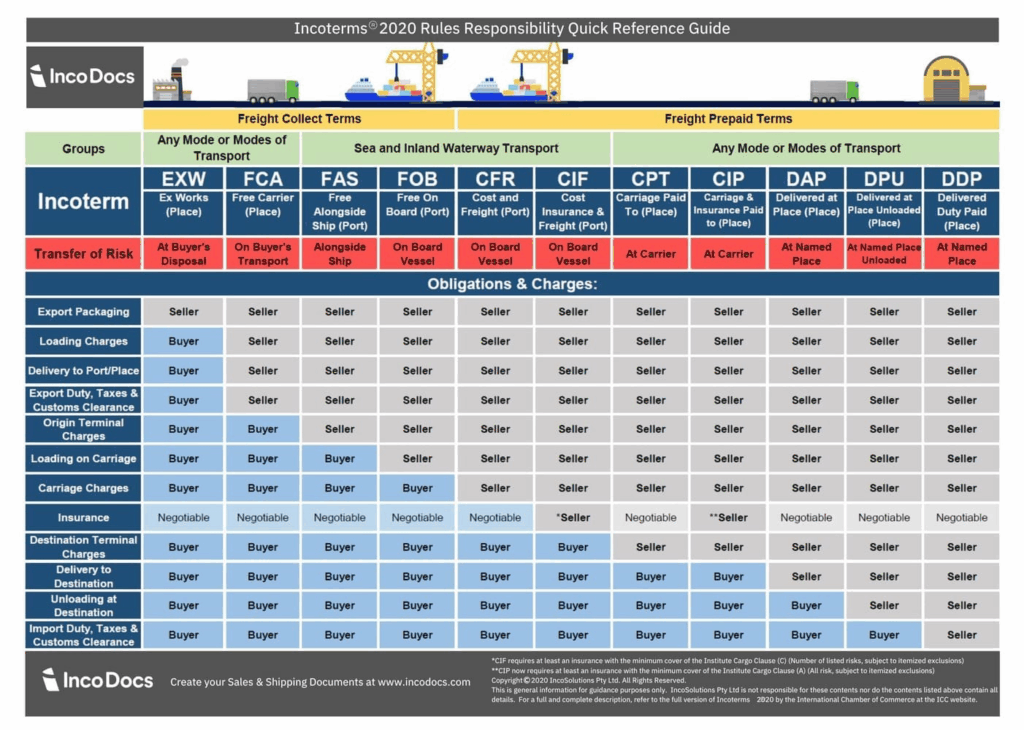
Incoterms® 2020 Explained, how they will affect global trade.
Incoterms®, short for International Commercial Terms, are rules published by the International Chamber of Commerce (ICC). They define responsibilities, costs, and risks in global trade, forming a key part of the contract of sale. These rules simplify transactions and ensure clear agreements between buyers and sellers, making it easier to negotiate terms effectively.
The ICC first introduced a set of Incoterms in 1936. Since then, they update Incoterms every 10 years since 1980 to match changes in trade. The latest version, Incoterms 2020, came into effect on January 1, 2020. This is the ninth revision, following updates in 1957, 1967, 1976, 1980, 1990, 2000, and 2010. Each update ensures the rules stay clear and reflect modern trade practices.
These updates to Incoterms clarify roles in trade contracts and ensure that parties understand their costs and risks associated with orders and shipments. Incoterms are stated on relevant sales & shipping documents to ensure shipments are processed smoothly.
This guide explains the updates in Incoterms 2020 and highlights the key changes for buyers and sellers. It also includes a chart to make everything clear and easy to follow.
Note: The content of this article and chart is only for general information purposes and shall not in any circumstances be considered bespoke legal advice or professional advice.
Key Takeaways
- Incoterms® define the roles, costs, and risks associated with a global trade agreement and shipment.
- The latest version, from 2020, is the 9th revision, updated to match modern trade needs.
- Key changes include replacing DAT with DPU and adding detailed cost and security rules.
- Terms are grouped for all transport modes, or sea freight only.
- Clear guidelines reduce disputes and simplify trade contracts globally.
- Understanding Incoterms® helps businesses handle international trade efficiently.
What are Incoterms?
Incoterms rules are international trade terms that buyers and sellers use to define responsibilities for tasks, costs, and risks during the sales and shipment of goods Internationally. These rules are widely accepted by governments and legal authorities, helping to facilitate international trade and making them an integral part of global trade contracts.
Incoterms rules help clarify when the seller’s costs and risks transfer to the buyer. They provide structure for smooth trade agreements and shipment processes. Some rules are specific to certain modes of transport, while others are designed for any mode of transportation. Understanding these differences is essential for avoiding confusion in international transactions.
Incoterms Rules for Any Mode of Transport (7 Terms):
- EXW – Ex Works
- FCA – Free Carrier
- CPT – Carriage Paid To
- CIP – Carriage and Paid To
- DAP – Delivered at Place
- DPU – Delivered at Place Unloaded (replaces DAT)
- DDP – Delivered Duty Paid
Incoterms for Sea and Inland Waterway Transport Only (4 Terms):
- FAS – Free Alongside Ship
- FOB – Free on Board
- CFR – Cost and Freight
- CIF – Cost, Insurance, and Freight
An overview of Incoterms 2020 for 11 Terms, 7 for any mode of transport.
EXW – Ex-Works or Ex-Warehouse
- Ex works is when the seller places the goods at the disposal of the buyer at the seller’s premises or at another named place (i.e., works, factory, warehouse, etc.).
- The seller does not need to load the goods on any collecting vehicle. Nor does it need to clear them for export, where such clearance is applicable.
FCA – Free Carrier
- The seller delivers the goods to the carrier or another person nominated by the buyer at the seller’s premises or another named place.
- The parties are well advised to specify as explicitly as possible the point within the named place of delivery, as the risk passes to the buyer at that point.
- 2020 Update: Allows for the issuance of a Bill of Lading with an onboard notation.
FAS – Free Alongside Ship
- The seller delivers when the goods are placed alongside the vessel (e.g., on a quay or a barge) nominated by the buyer at the named port of shipment.
- The risk of loss of or damage to the goods passes when the products are alongside the ship. The buyer bears all costs from that moment onwards.
FOB – Free On Board
- The seller delivers the goods on board the vessel nominated by the buyer at the named port of shipment or procures the goods already so delivered.
- The buyer becomes responsible for bearing all costs and risks from the moment the goods are on board the vessel, so the buyer will pay for the International transportation, insurance, and any further costs.
- Seller’s costs include delivering the goods to the port of shipment, loading costs onto the vessel, and export duties, taxes, and customs clearance.
- Buyer covers costs including main carriage (freight) costs from the port of loading to the port of destination, unloading costs at the destination port, and import duties, taxes, and customs clearance at the destination country.
CFR – Cost and Freight
- The seller delivers the goods on board the vessel or procures the goods already so delivered.
- The risk of loss of or damage to the goods passes when the products are on board the vessel.
- The seller must contract for and pay the costs and freight necessary to bring the goods to the named port of destination.
CIF – Cost, Insurance and Freight
- The seller delivers the goods on board the vessel or procures the goods already so delivered. The risk of loss of or damage to the goods passes when the products are on the ship.
- The seller must contract for and pay the costs and freight necessary to bring the goods to the named port of destination.
- The seller also contracts for insurance cover against the buyer’s risk of loss of or damage to the goods during the carriage.
- The buyer should note that under CIF the seller is required to obtain insurance only on minimum cover. Should the buyer wish to have more insurance protection, it will need either to agree as much expressly with the seller or to make its own extra insurance arrangements.
CPT – Carriage Paid To
- The seller delivers the goods to the carrier or another person nominated by the seller at an agreed place (if any such site is agreed between parties).
- The seller must contract for and pay the costs of carriage necessary to bring the goods to the named place of destination.
CIP – Carriage And Insurance Paid To
- The seller has the same responsibilities as CPT, but they also contract for insurance cover against the buyer’s risk of loss of or damage to the goods during the carriage.
- The buyer should note that under CIP the seller is required to obtain insurance only on minimum cover. Should the buyer wish to have more insurance protection, it will need either to agree as much expressly with the seller or to make its own extra insurance arrangements.
DAP – Delivered At Place
- The seller delivers when the goods are placed at the disposal of the buyer on the arriving means of transport ready for unloading at the named place of destination.
- The seller bears all risks involved in bringing the goods to the named place.
DPU – Delivered At Place Unloaded (replaces Incoterm 2010 DAT)
- DPU is a new Incoterm rule that replaces the former Incoterm DAT (Delivered At Terminal).
- The seller delivers when the goods are unloaded and placed at the disposal of the buyer at a named place of destination.
- The seller bears all risks involved in bringing the goods to, and unloading them at the named place of destination.
DDP – Delivered Duty Paid
- The seller delivers the goods when the goods are placed at the disposal of the buyer, cleared for import on the arriving means of transport ready for unloading at the named place of destination.
- The seller bears all the costs and risks involved in bringing the goods to the place of destination. They must clear the products not only for export but also for import, to pay any duty for both export and import and to carry out all customs formalities.
- Under DDP, the seller pays for all shipping costs, including import customs clearance, import duties & taxes, and any additional charges involved in delivering the goods to the named place of destination.

Follow Us!